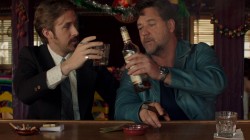Cinema | June 1st, 2016

Shane Black’s most satisfying film to date, “The Nice Guys” absolutely pulverizes lurid period milieu, shaggy dog private investigation, “Chinatown” corruption narrative, odd couple buddy bromance, and slapstick noir parody in an industrial blender set to emulsify on maximum torque.
Pairing Ryan Gosling – as the world’s worst shamus – with a teddy bearish and relaxed Russell Crowe as a stone-faced straight man, “The Nice Guys” works, against the odds, as a metafiction that manages to simultaneously send up and celebrate the tropes and formulas originated in the hardboiled pages of master stylists Chandler, Hammett, and Cain, minus most of the cynicism and misogyny.
While some of the too-good-to-be-true predicaments endured by Gosling’s Holland March are reportedly based on the exploits of Joel Silver acquaintance Jay Joseph, whose personal experiences also showed up as part of the Black-penned “Kiss Kiss Bang Bang,” Black inscribes the 1977 Los Angeles setting with a generous dollop of post bicentennial nostalgia (love that early “Jaws 2” billboard).
The plot, such as it is, burrows deep into the salacious environment of cocaine-fueled Hollywood Hills porn production and distribution, drawing inevitable comparisons to Paul Thomas Anderson’s cult favorite “Boogie Nights,” with which “The Nice Guys” shares some sensibility and soundtrack.
As ringmaster, Black is unafraid to allow Gosling and Crowe, and the rest of the ace supporting cast for that matter, to go big or go home, but the gags – from a ridiculous pants-around-the-ankles toilet stall confrontation complete with uncooperative door and pesky lit cigarette to a hysterically bleak encyclopedia of gruesome gravitational violence that gets serious mileage from Newton’s three laws of motion – don’t diminish the film’s verisimilitude as a keep-‘em-hooked procedural.
While the easy chemistry between the leading men has received plenty of attention, the big find and breakout of “The Nice Guys” is Angourie Rice as Holland’s teenage daughter Holly, a resourceful and competent kid who provides the story with its moral center. Rice steals scene after scene, convincingly inhabiting a whip smart daughter one step ahead of her blundering papa, no matter how many times she is banished from the danger.
Rice is joined by a higher-than-expected number of women who leave marks in smaller roles. Yaya DaCosta, Lois Smith, Margaret Qualley, Daisy Tahan, and Kim Basinger thoroughly enliven the proceedings, although I would have appreciated at least one more juicy scene between the latter and her “L.A. Confidential” costar Crowe.
Holly is Black’s shrewdest move, particularly because the character alleviates some of the inevitable monotony of the opposites-attract buddy bonding (for which Black earned his cinematic doctorate decades ago). The differentiation in the relationships she develops with her father and with Crowe’s Healy, for whom she instinctively and openly worries, digs deeper than required in search of answers about what it means to be a good person.
Additionally, Black knows that Holly will be able to extract information from characters who would otherwise be uncomfortable and guarded if approached by the men, and “The Nice Guys” understands the predicament faced by young women in an exploitative and hypermasculine industry at a particularly sleazy point in time.
February 16th 2026
February 16th 2026
February 9th 2026
February 4th 2026
January 26th 2026
__293px-wide.png)
__293px-wide.jpg)


_(1)__293px-wide.jpg)
